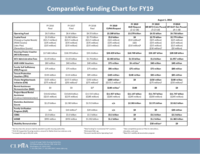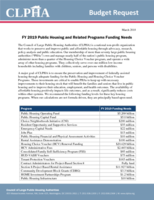On February 14, by a vote of 83 to 16, the U.S Senate passed a bipartisan appropriations package to fund nine departments and other agencies, including the U.S Department of Housing Urban Development, through September 2019. The spending deal passed the U.S. House of Representatives later that evening by a vote of 320 to 128. President Trump signed the appropriations bill into law on February 15.
The final version of the deal keeps intact the conference agreement for the FY19 Transportation, Housing and Urban Development and Related Agencies (THUD), which includes $4.653 billion for the Public Housing Operating Fund, $2.775 billion for the Public Housing Capital Fund, and $25 million for a new Family Mobility Demonstration program.
Click here for funding levels for some programs of interest to CLPHA members.
The Trump Administration released its fiscal year 2019 (FY19) budget on Monday, February 12th. The budget requests $41.24 billion in funding to the Department of Housing and Urban Development (HUD). The proposal would completely eliminate all funding in FY19 for the Public Housing Capital Fund, Choice Neighborhoods Initiative, HOME, CDBG, Housing Trust Fund, and other programs. The proposal would slash funding for the Public Housing Operating Fund by over $1 billion from last year’s request.
After the Trump Administration finalized its FY19 budget request, Congress subsequently passed a two-year budget agreement for FY18 and FY19 with higher funding caps than the previously restrictive sequestration allowed. Having an FY18 agreement enables Congress to move beyond funding the government under successive continuing resolutions (CRs) and finalize FY18 spending levels. For FY19, the Administration quickly modified its budget submission and provided an addendum to Congress that included an additional $2 billion to HUD.
If the FY18 budget proposal was considered harsh the FY19 proposal, while more detailed and thoughtful, is certainly more severe, punitive, cost-shifting and contradictory. Once again, the Trump Administration budget proposes to eliminate and eviscerate programs for the poor while cost-shifting the burden onto the poor and onto state and local governments already under severe budget constraints.
The budget proposal provides HUD with $41.28 billion in gross discretionary funding for FY19. This amount is equal to 14 percent or $6.45 billion less than the current continuing resolution (CR) annualized amount for FY18. This decrease is realized primarily through elimination of certain programs and reductions in the rental assistance programs, including over $3 billion eliminated from public housing alone. These dramatic HUD reductions come at a time when the federal government should be investing in public housing as part of the nation’s infrastructure, as such investment generates economic growth, creates jobs, bolsters productivity, and generates tax revenue for cash-strapped localities. It also comes at a time of increasing evidence showing a link between stable housing and social determinants of health, education and employment outcomes.
If realized, the short-sighted cuts included in the HUD budget would have severe and cumulative effects on public and affordable housing programs across the country, while shredding the safety net on which many low-income Americans rely. The magnitude of these proposed cuts is alarming – funding for the Public Housing Capital Fund is completely eliminated and the Public Housing Operating Fund would sustain a 26 percent cut from the FY18 CR annualized amount. These particular reductions not only undermine basic health and safety concerns, they also contradict the Administration’s professed goal of promoting public-private partnerships. These cuts will make it virtually impossible to leverage private investment for the Rental Assistance Demonstration (RAD) program, which HUD advances as a major priority in this budget. Since RAD relies on the Capital Fund and Public Housing Operating Fund to convert to the Section 8 platform, cuts to these programs would totally undermine the RAD program and any future expansion.
Click here to read CLPHA's Budget Analysis of HUD's FY19 Budget Proposal













